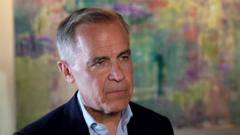The Trump administration's latest move to relax certain tariffs on carmakers highlights ongoing concerns about economic stability within the automotive industry.
Trump Eases Tariffs on Automakers Amidst Economic Uncertainty

Trump Eases Tariffs on Automakers Amidst Economic Uncertainty
Changes to car tariffs aim to alleviate financial pressures on U.S. car manufacturers while maintaining some levies on imports.
In an effort to relieve pressure on American car manufacturers, President Trump is preparing to sign an executive order that will ease specific tariffs imposed on the automotive industry. As confirmed by administration officials, the upcoming adjustments will primarily benefit companies such as Ford and General Motors, who have voiced concerns that these tariffs are detrimental to U.S. manufacturing.
As part of the changes, the punitive 25 percent tariff on imported vehicles will remain in effect, but carmakers will be exempted from additional levies on essential materials like steel and aluminum, effectively lowering their production costs. Additionally, manufacturers will have the opportunity to receive tariff reductions based on the costs of certain imported components, although these benefits will decrease over the next two years.
This decision comes in response to significant pushback from automakers regarding the unpredictability and strain caused by the current trade policy. Earlier this week, General Motors revealed a reevaluation of its profit forecasts, citing the profound uncertainty induced by Trump's tariffs. The company's chief financial officer, Paul Jacobson, remarked that any estimates moving forward are mere “guesses,” reiterating the challenges posed by these economic conditions.
In summary, while the easing of some tariff restrictions may provide a short-term solution for U.S. automakers, the overarching economic uncertainty remains a pressing concern for the industry's future sustainability. As these companies navigate a complex landscape defined by trade policies that fluctuate, the implications for both production costs and market stability continue to be significant.
As part of the changes, the punitive 25 percent tariff on imported vehicles will remain in effect, but carmakers will be exempted from additional levies on essential materials like steel and aluminum, effectively lowering their production costs. Additionally, manufacturers will have the opportunity to receive tariff reductions based on the costs of certain imported components, although these benefits will decrease over the next two years.
This decision comes in response to significant pushback from automakers regarding the unpredictability and strain caused by the current trade policy. Earlier this week, General Motors revealed a reevaluation of its profit forecasts, citing the profound uncertainty induced by Trump's tariffs. The company's chief financial officer, Paul Jacobson, remarked that any estimates moving forward are mere “guesses,” reiterating the challenges posed by these economic conditions.
In summary, while the easing of some tariff restrictions may provide a short-term solution for U.S. automakers, the overarching economic uncertainty remains a pressing concern for the industry's future sustainability. As these companies navigate a complex landscape defined by trade policies that fluctuate, the implications for both production costs and market stability continue to be significant.






















